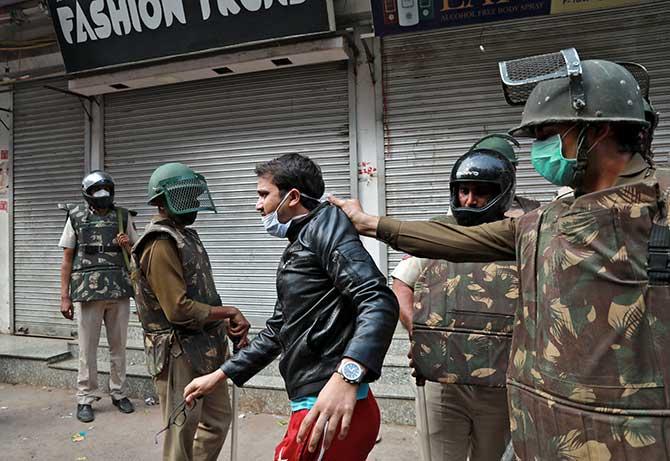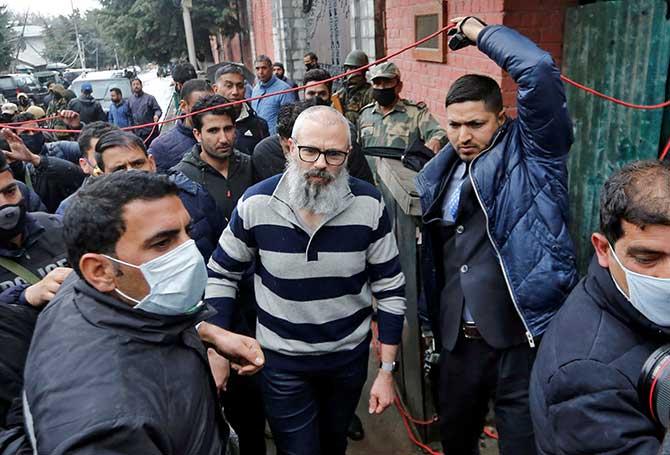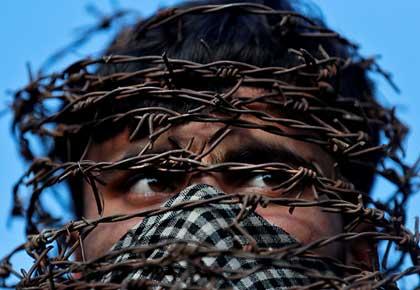‘If the virulence of COVID-19 has muted the toxicity of the BJP’s communalism, it will be an example of good coming out of the pandemic,’ notes Amulya Ganguli.
It is odd that Human Rights Watch chosen the present moment to release a report calling on Parliament to repeal the Citizenship (Amendment) Act.
It is obvious that harried as the government and the people are by the pandemic, neither will take much notice of the international watchdog body’s observations, however effective they might have been a few months ago when the agitations against the CAA, the National Register of Citizens and the National Population Register were at their height.
Now, these issues have been pushed very much to the background and constitute no part of the public discourse as the government and every individual grapple with a crisis, the like of which they have never faced before.
Besides, the deadly impact of coronavirus has affected the whole world.
As a result, the governments and human rights activists outside India will have little time to consider the comments of the HRW.
For all practical purposes, the CAA-NRC-NPA issue is no longer live.
That doesn’t mean, of course, that they have lost their salience.
It is obvious that once the situation returns to normal, they may again come to the fore if only because of the deep concern which they have caused among India’s largest minority and also the ‘secular’ camp.
But there is also the possibility that the present crisis is so lethal and apocalyptic that conditions may not become normal any time soon.
Moreover, the normality of the post-lockdown period may prove to be quire different from what it was earlier.
The reason is that the social and economic fallout of the present cataclysmic times is likely to be so deep and widespread that few can predict how the scene in India and, indeed, in the world will look once the toxic virus has been eliminated.
Apart from COVID-19’s impact on society and the economy, even the effect of the seemingly incurable — as of now — infection on individuals is unclear.
As is known, there has been a doubling of the incidents of dometic violence ever since the lockdown came into force according to the National Commission for Women.
How this rise in intolerance will affect marital and familial lives is not known.
Moreover, such turmoil in personal lives can be exacerbated by a dire economic fallout if the growth rate plummets to 1.6 per cent as Goldman Sachs has said.
At all levels, therefore — personal, social and economic — the country will face an unprecedented upheaval.
How such disturbed conditions will affect political life is another unknown.
What is known, however, is that it will be unrealistic to expect a return to exactly the kind of politics which the county saw, say, at the beginning of the year when the government was vigorously pushing through its pro-Hindu agenda on Kashmir and citizenship among other things while the Opposition and the Left-Liberal activists believed they had found in the CAA-NRC-NPR controversies a range of issues which would push the government onto the back foot.
They were also encouraged earlier by the support which their stance on Kashmir and the citizenship issues had received from sundry international organisations, including the UN.
The HRW’s report is a reflection of that outlook.
But now foreign governments and organisations dealing with civil liberaties do not have the time to look at India’s domestic issues.
The attitude of the BJP and other political parties, too, may undergo a subtle change.
It has to be seen whether the BJP will be as gung-ho as before on Kashmir and the ciitzenzhip initiatives.
As the release of Dr Farooq Abdullah and Omar Abdullah from detention shows, the government is looking at making a new beginning in the Union territory.
Even if the cornerstone of its policy is to revive the political process under a new pro-BJP outfit, the Apni Party, led by a former People’s Democratic Party minister, Altaf Bukhari, it is obvious that the latter will not find it easy to function if the former chief ministers remained in jail.
A more nuanced approach to politics by the BJP is also evident from the way the party has distanced itself from its rabid supporters in the media like the right-wing television channels which made much of alleged Muslim perfidy by using the Tablighi Jamaat’s violation of the stay-at-home diktat at a gathering in a New Delhi mosque.
Instead of the shrill denunciations of the television anchors, the BJP’s chief minister in Karnataka, B S Yediurappa, said that ‘not a word’ should be said against the Muslims as a community.
BJP President J P Nadda also echoed this view, suggesting that the party is no longer willing to repeat the acerbic comments which characterised its approach to the Delhi assembly election.
If the virulence of COVID-19 has muted the toxicity of the BJP’s communalism, it will be an example of good coming out of the pandemic.
Amulya Ganguli is a writer on current affairs.
Source: Read Full Article






